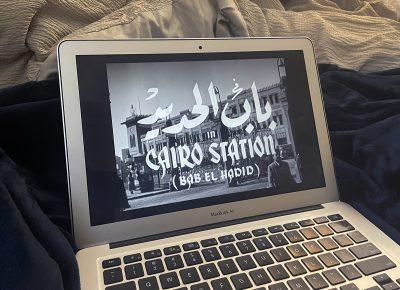It’s not often that a mammoth-sized streaming platform such as Netflix contains the work of 20th-century foreign auteurs, but their extensive Youssef Chahine collection is a welcomed exception. His most popular film, “Cairo Station,” is one that anyone with a subscription should watch if they want a change of pace from the typical streaming content.
Chahine is an Egyptian director who made over 40 films from the 1950s into the 2000s, and is one of the most notable figures in what is known as “The Golden Age” of Egyptian cinema. Those films were typically similar to those of Hollywood studio classics with the glitz and glamour and happy endings. Chahine’s very early work fit this mold to a tee, but “Cairo Station” was so starkly different that the film was even banned in Egypt due to its themes of taboo psychosexual behaviors.
The film takes place over just one day and is centered around “Qinawi,” a poor and limping newspaper vendor who works in and around a bustling post-revolution Cairo train station. Qinawi — who is played by Chahine himself — is very introverted and extremely lonely, and he isn’t that intrigued by money or success. Instead, the thing he craves the most is women.

Throughout the movie, we see close ups of Qinawi’s eyes glaring at women for extended amounts of time. He looks and follows them, but rarely talks to them. He gets beaten up by a man for staring at his wife. His locker area is filled with magazine cutouts of half-naked women. We aren’t shown anything else that Qinawi cares about, and this is because there is nothing else. He is solely and obsessively fixated on the women he sees during his time at the busy station and the cutouts he hangs on the walls.
“Hanuma” — played in show-stealing fashion by Hind Rostom — is a soft-drink vendor that Qinawi takes particular interest in, despite Qinawi knowing that she is engaged to luggage porter and union organizer “Abu Siri.” Qinawi continuously tries to court Hanuma, unsuccessfully, and he starts his descent from a lonely introvert to a stalking murderer.
The entire film takes place at the central station, and the station and its characters act as a representation of the greater socio-political state of Egypt. Qinawi’s consistent desire to leave the city and retreat to traditional lives with traditional gender roles is contrasted by the post-revolution modernisms of the busy station and the feminist protests that have taken place there.
“Cairo Station” has also gained new significance in recent years as one of the first movies to truly deal with the psychosexual state of the incel archetype and the correlation between masculinity, socioeconomic class, mental illness and violence against women.
When Qinawi hears about a murder in the newspaper, he is inspired to replicate the man’s actions, which bears comparison to the lore that mass murderers have amassed across the dark corners of the internet and the deadly replications of those events. Qinawi’s introverted and lonely “nice guy” male persona is a facade for severe sexual repression and how that, combined with many other external factors including mental illness and economic and social status, can lead to bursts of extreme violence against women.
However, Qinawi is not the only one who commits violence against women.. Abu Siri hits Hanuma after she is seen dancing and singing with a band on a train, despite his positive role as a leader for workers’ rights and his great power in the daily station dynamic.
This is part of the larger commentary that Chahine is creating on the role of masculinity during that time period. After a man hits Qinawi for staring at his wife, the man tells her, “It’s your fault! Why did you unveil your face? Cover yourself up.” When Hanuma complains to Abu Siri about Qinawi’s increasingly perverted actions, Abu Siri responds by saying, “Why can’t you behave? It must be your fault.” As the viewer knows, Qinawi’s actions are not the victim’s faults, but these reactions from male characters is Chahine showing Egyptian society’s handling of sexual harassment.
While undoubtedly taking inspiration from Alfred Hitchcock’s work, “Cairo Station” is a movie that refuses to be categorized into a single genre. The film opens as a neorealism comedy. Then it becomes a psychosexual thriller. By the end, it’s nearly a slasher horror movie. But what remains consistent throughout is the brisk storytelling blend between sociopolitical realities of post-colonial Egypt and the state of a poor and sexually repressed man.
“Cairo Station” is shot in a crispy black-and-white with extremely black blacks and extremely white whites, with a soundtrack that resembles a classic Hollywood melodrama, all boiled down to 77 minutes of greatness. It’s rightfully thought of as one of the most groundbreaking African films of all time, and is an accessible gateway into the depths of Youssef Chahine’s filmography.
























































































































